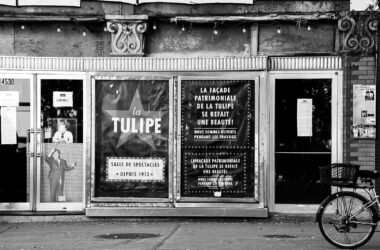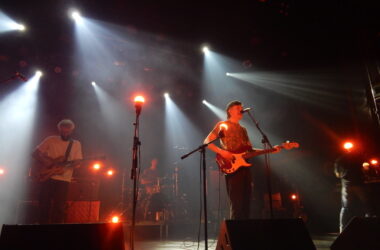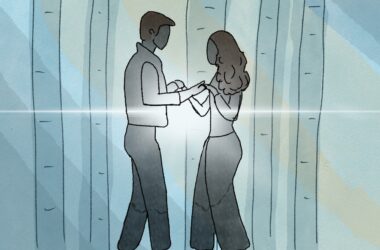Mashrou’ Leila celebrated their 10th anniversary this year; to commemorate the occasion, the band released The Beirut School, their fourth studio album. The band have begun international superstars, with their tour covering Europe, the Middle East, before making stop in Montreal at Club Soda on Oct. 9. Singer Hamed Sinno, violinist Haig Papazian, keyboardist and guitarist Firas Abou Fakher, and drummer Carl Gerges brought powerful Arab energy that radiated through the venue. Sinno and Mashou’ Leila have been Arab 2SLGBTQI+ activists and trailblazers, completely flipping the script on the homophobia and heteronormativity that plague much of mainstream Arab pop music. The band, whose name translates to either ‘The Night Project’ or ‘Leila’s Project’, played a set full of warmth and inspiration.
The night began with a performance from one of Montreal’s own Iraqi-Canadian alternative hip-hop artist Yassin “Narcy” Alsalman. Through his show, Narcy also shed light on current protests in Iraq against corruption, rising unemployment, and poor public services. Besides his career in music, Narcy is also an actor, professor, and multimedia artist, currently teaching one of Canada’s only hip-hop courses at Concordia University. Narcy’s performance and call to action created an intense and impassioned atmosphere in anticipation for the main act.
Mashrou’ Leila’s Hamed Sinno opened with a spoken word poem, followed by a performance of “Roman,” an ode to rebellion and hope. Sinno’s ardent and energetic call for resistance inspired a fiery energy in the crowd and was a fitting way to inaugurate the concert.
Another standout of the night was “Jinn,” written after Sinno’s father passed away. In the song, Sinno detailed his struggle to mourn, using drugs and alcohol as a means to cope. Sinno’s soothing but strong voice allowed the audience to feel the pain, but also his resilience.
Throughout their set, Mashrou’ Leila was accompanied by audiovisuals that enhanced the deep lyrical meaning behind many of their works. During “Radio Romance,” a projection of two male-presenting lovers tried to embrace flooded the screen with the impending night and many protestors blocking their way.
The band’s set was filled with thoughtful and political calls to action; the dreamy and multidimensional ballad “Tayf,” Sinno explained, is about the Lebanese government’s crackdown on queer clubs and bars in the country.
The band’s outspoken activism has led to multiple controversies, including the government of Egypt banning Mashrou’ Leila from ever performing in the country again. Sinno explained that the song “Cavalry” highlights those struggles against government oppression and calls to fans to continue supporting resistance. Additionally, the accompanying music video echoes the same sentiments, resembling the protests by Palestinian activist Ahed Tamimi in the year prior. The images portrayed a young girl attempting to fight soldiers who are invading her home, arresting her family, and cutting down their olive trees, .
In the encore, the band closed off the night with “Marrikh.” Sinno explained that the song was about his struggles with mental illness and the stigma that comes with it; therefore, he asked the audience to put down all their phones, and the venue to turn off the lights. “Marrikh” was a powerful, dreamy, and bittersweet end to the night, with audience members closing their eyes and drifting into the finale.









